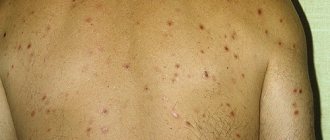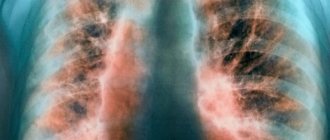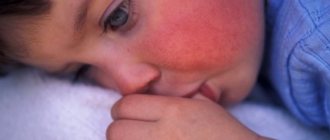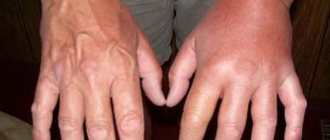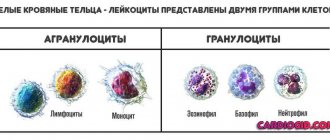Causes of cough asthma
The cough form of bronchial asthma has no distinctive features based on causative factors, because this is just one variation of classic asthma.
Asthma itself is a heterogeneous disease. This means that the reason lies not only in classic allergies, but also in the body’s hypersensitivity to non-allergic factors. Examples of this type of irritant are: physical activity, cold air and much more.
Attention! Each person develops his own version of asthma (allergic, non-allergic, mixed, etc.) depending on the genetic and functional characteristics of the body.
There are certain predisposing factors that can also be considered the causes of this disease:
- genetic predisposition (the presence of bronchial asthma or other allergic diseases in blood relatives (mother, father), which were confirmed by appropriate diagnostic methods);
- young age (including children);
- episodes of allergic reactions upon contact with any substances that preceded the development of the cough form of bronchial asthma;
- frequent colds;
- chronic bronchitis or chronic obstructive pulmonary disease with frequent exacerbations;
- smoking;
- occupational hazards (chemical industry, work in mines, with asbestos, etc.);
- obesity, especially with the accumulation of fat deposits in the abdominal area. This leads to limited mobility of the main respiratory muscle - the diaphragm. As a result, the lungs are poorly ventilated, and bronchial secretions stagnate. This contributes to the development of chronic inflammation;
- carious teeth, chronic tonsillitis, rhinitis and other processes in the upper respiratory tract, contributing to the long-term presence of foci of infection and increased reactivity of the body;
- frequent stress, irregular daily routine.
List of allergens that can cause asthma, incl. her cough form
| SPECIFIC | NON-SPECIFIC |
A) Non-infectious nature
B) Infectious agents |
|
There is an opinion that the cough form of bronchial asthma occurs in people with cardiovascular diseases.
Possible complications
Although bronchial asthma is inherently very unpleasant and problematic, if left without proper attention, there is a possibility that it will seriously worsen and become even worse. in this case, the following quite significant complications may occur. They are all divided into the following categories:
- acute or chronic respiratory;
- cardiac;
- gastrointestinal;
- metabolic;
- cerebral.
Each category has its own dangers, so if it is not promptly treated, bronchial asthma can greatly harm the body.
Symptoms of the cough form of bronchial asthma
The comparison table visualizes the symptoms of the two types of asthma to better understand the differences between them:
| Cough variant of bronchial asthma | Classic attack of bronchial asthma |
| 1. Main symptom: dry cough, paroxysmal, more than 4 weeks. 2. Provoke: specific and nonspecific allergens (for example, cold, sports, respiratory infection, active and passive smoking) 3. Time of cough onset: in the morning or upon contact with allergens. 4. Without the necessary treatment for a long time, it can develop into a classic attack of bronchial asthma. | 1. It also begins with a dry, unproductive cough, which develops into expiratory dyspnea (difficulty breathing when inhaling), and then to an extreme degree - suffocation. Dry wheezing is heard in the lungs, both by the patient himself and by those around him. There is sputum, it comes out poorly and only at the end of the attack (the person feels “stuffiness in the chest”); 2. Provoking factors are the same; 3. Time of onset of symptoms – at night, in the morning or upon contact with allergens. 4. Symptoms change from coughing to choking during one attack. Lack of treatment will only increase the severity and frequency of attacks. |
conclusions
Bronchial asthma in adults is a fairly serious problem that can lead to quite significant complications. Therefore, it is very important not to ignore its manifestations, but to be able to identify them and, at a basic level, to be able to deal with them. Of course, you should not exclusively self-medicate, otherwise you will aggravate the situation, but it is still worth at least taking basic measures - and seeing a doctor who will assess your condition and choose exactly the treatment that is most appropriate in your specific situation.
It will be interesting to know what are the symptoms of pneumonia in adults, as well as what stage of tuberculosis is dangerous for others
Features of diagnosing Corrao syndrome
The basis of the diagnostic search for the cough form of bronchial asthma is:
- Consultation with a pulmonologist, allergist.
- Spirography. This research method allows you to assess the quality of dysfunction of external respiration, i.e. what underlies the pathology - a reversible obstruction of bronchial patency, as in bronchial asthma, or some kind of replacement processes in the lung tissue itself.
- Spirography after a trial treatment with bronchodilators or a single inhalation of this drug. For any type of asthma, incl. cough, the test will be more likely to be positive (i.e., the quality of breathing will improve).
- Skin allergy tests. They are performed only in patients under 60 years of age who have not taken antihistamines or glucocorticosteroids within the last month.
- Sputum examination.
- Picloflowmetry. The quality of exhalation is assessed.
Standard laboratory and instrumental research methods are also performed: general blood test, urinalysis, ECG, fluorography, biochemical blood test. This is necessary to exclude all causes of chronic cough.
Basic methods and methods of therapy
After a thorough diagnosis, the doctor selects preliminary treatment. It is usually the same as with typical asthma. Corticosteroids are prescribed orally or by inhalation.
But this doesn't help everyone. Usually there is a slight improvement, only a slight decrease in cough. Bronchial asthma itself does not disappear. In this case, the doctor may prescribe glucocorticoids, which are taken orally. If this does not help, then it’s time to take a weekly course of prednisolone.
No treatment can guarantee relief from this disease, since asthma of any kind is a chronic inflammatory process in the respiratory tract. The disease remains with a person for life. It is especially important to promptly identify the disease in children. This is the only way the disease can be treated with the help of a properly selected course.
Patients should know that bronchial asthma of any form cannot be cured using traditional methods. This disease requires constant medical supervision and medication.
You can’t just buy an inhaler and think that the symptoms of bronchial asthma are over. And any medicine requires selection of dosage strictly in accordance with the individual characteristics of the patient, including his weight and age. Even the gender of the patient plays a role.
We recommend reading: Allergic swelling of the face: photo, ICD, treatment, in a child, what to do, at home, causes
As an additional means, doctors recommend sanatorium-resort treatment. To prevent illness in children, parents should go to the sea with them once a year. The salty sea air is the best way to benefit a child's body.
If this is not possible, then an acceptable alternative is salt caves. They are becoming increasingly popular. The results of such treatment are felt quite quickly. In addition to improving breathing, the body's protective functions increase. All internal organs begin to work better, and phlegm comes away without difficulty.
After a thorough diagnosis, the doctor selects preliminary treatment. It is usually the same as with typical asthma. Corticosteroids are prescribed orally or by inhalation.
Treatment of cough asthma
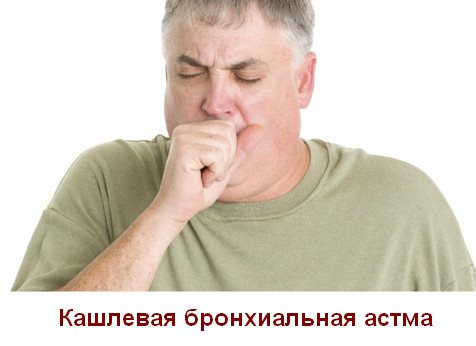
There are two groups of therapeutic measures:
Non-drug treatment
The basis of successful treatment is avoiding contact with allergens! The faster and better measures are taken to reduce the impact of provoking factors (allergens) on the body, the better the prognosis of the disease and the lesser the need for medications.
What does “excluding allergens” mean?
- First of all, self-discipline and the desire to get well! Specific activities: wet cleaning, ventilation. This also includes the most infrequent contacts with what provokes coughing attacks - animals, pollen, food, dust and much more.
- Work and rest schedule, especially if neuropsychic stress provokes attacks of the cough form of asthma.
- Breathing exercises. The Buteyko technique is popular.
- A healthy lifestyle, avoiding smoking should be a priority. Each cigarette increases the chance of worsening the disease and turning the cough form into classic asthmatic attacks.
- During the period of viral infections, follow preventive measures to prevent infection. If you are not allergic to the components of influenza vaccinations, then they are mandatory.
Drug treatment
The following drugs are used:
- Bronchodilators - relieve spasm of bronchial smooth muscles (the coughing attack passes): B2 receptor agonists: Salbutamol, Fenoterol - short-acting, the basis for stopping an attack that occurs; long-acting drugs are also used - Salmeterol; M-anticholinergics – Atrovent.
- Medicines with anti-inflammatory effects: inhaled glucocorticosteroids - Beclomethasone, Budesonide; agents that improve sputum discharge - ACC, Ambroxol (Lazolvan).
- Antiviral, antimicrobial drugs - only in the presence of infection.
- Physiotherapy, chest massage.
Attention! These types of treatments can only be prescribed by a specialist doctor!
Cough form of asthma in children
The development of Corrao syndrome in children is based on the immaturity of the body's functional systems: immune and respiratory.
The respiratory tract in children is narrow, the mucous membrane produces an insufficient amount of protective factors. There is hyperreactivity of the bronchial system, especially in boys. When exposed to an allergen or infection, it often manifests itself in the form of an asthmatic attack. Imperfect sputum evacuation is another mechanism. It promotes the retention of microorganisms in the lungs, which leads to chronic infection in the respiratory tract.
The response of the immune system in children depends not only on its functional state, but also on genetically stored information.
The clinical symptoms of the cough form in children are the same, but are more severe, especially against the background of chronic respiratory tract infection with frequent exacerbations. Also, in children, cough asthma often develops into the classic form.
Important! A child with a chronic cough must be examined without fail to exclude the classic and cough variants of asthma!
Characteristics of asthmatic cough
The disease has periods of exacerbation and remission. The signs of an asthmatic cough at this time are almost the same, but with an exacerbation it is more difficult to get rid of it.
- sudden barking cough;
- labored breathing;
- dyspnea;
- discharge of a small amount of clear sputum;
- nasal congestion;
- pale skin;
- dryness and severe sore throat;
- the appearance of wheezing;
- increased heart rate.
With a prolonged attack, vomiting may begin, and children may have blue lips. The person will be at risk of suffocation due to poor ventilation.
Symptoms of cough in asthma in children are characterized by increased intensity. Due to increased activity, the lack of oxygen quickly progresses. The child begins to worry, get nervous, he does not understand what is happening to him. Then an attack of dry cough begins, it is difficult for him to exhale completely, he complains and worries. The intensity of the attack increases.
In severe cases, the child may lose consciousness and require hospitalization. All parents should know the signs of bronchial asthma in cough form so as not to confuse them with other diseases.
Cough asthma can be a complication after viral infections.


